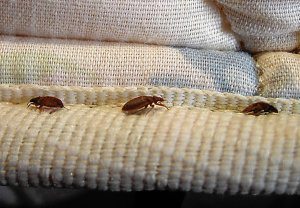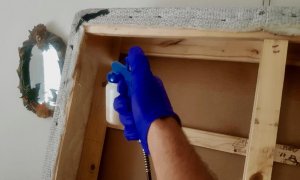That old childhood ditty about “sleeping tight so the bed bugs don’t bite” is no longer an innocuous rhyme from another time and place. Bedbugs are indulgent and inconsiderate travelers that couldn’t care less about social status, sanitation or even hotel quality.
We recently wrote about some horrifying facts about bed bugs any hotelier might find hard to digest, but to put it bluntly, they are bloodsuckers and can suck the blood out of more than just the innocent victims the prey upon. The Pittsburgh hotel and lodging industry’s online reputations and bottom lines are just as vulnerable to a bed bug’s vampiric effects, and unfortunately their presence has become more and more widespread in all aspects of human society.
This epidemic of infestations is due to a host of diverse issues, which include increased travel, the reduced use of pesticides such as DDT, which was banned in the 1970s, lack of knowledge about preventing infestations and ineffective pest control practices. These are citable culprits, but there may be others lurking underneath those seemingly sterile, starched sheets.
Bed bugs, which are brown or red in color and the size of an apple pit, can travel in luggage and clothing, and once they infiltrate an area, they make themselves at home everywhere. Like bad house guests, they don’t want to relinquish a good meal and refuse to go back where they came from (and stay there).
The hotel and lodging industry is faced with considerable challenges in dealing with bedbug infestations because their transient nature translates into the potential of a fresh wave of bed bugs every day. They can arrive in the backpack of a hotel worker who may have unwittingly picked them up either at home or while commuting via public transportation to their jobs, or via the numerous hotel guests checking in or out numerous times throughout any one month.
The key to dealing with these insect pests can be summarized in the boy-scout mantra, ‘Be prepared’, which in terms of bed bugs means get preventative immediately and of course act swiftly at first sight of any signs of these little buggers.
With that, our entomologists and pest control experts have created the following guide, which details the direct and indirect costs bed bugs can have on your hotel or lodging business, the industry standards for effective prevention techniques, how to devise and execute a complete, concise and effective compliance plan, an overview of existing bed bug elimination techniques as well as an introduction to Aprehend, the newest and what’s proving to be the most effective bed bug extermination solution on the market today.
Read on or call to speak with our pest experts today (412) 252-5200.
The Costs of Bedbugs to the Pittsburgh Hotelier

If you take anything away from this guide, take this — the best thing to do when someone complains about bedbugs in their room is refund their hotel stay, no questions asked. Guests are unlikely to cause a stink and/or initiate legal proceedings when a hotel or lodging establishment responds sympathetically; appealing to their discomfort will go along way to avoid financial and reputation-damaging repercussions down the road.
This leads us to control protocols, which include the use of Apprehend.
Hotels usually budget for pest control issues but bedbugs are more challenging than ordinary insects. They are also more costly to control and demand that the hotel or lodging business maintain a tight grip on protocols dictated by pest management specialists to prevent repeat bug invasions.
In addition to having a significant impact on a brand’s reputation, a hotel or lodging business can also lose significant revenue by not distinguishing themselves as facilities with bed bug prevention programs. It’s wise to boldly advertise that fact, as planners of large conventions seek out such establishments, and will in all probability, avoid a hotel that fails to offer this assurance to its guests.
Effective Bed Bug Prevention Techniques
For one thing, every hotel and lodging establishment should have a specific policy concerning bed bugs, which centers on staff enforcement. Everyone must agree to work together to combat the problem, especially the front desk, where reception workers interface constantly with hotel guests. They must be confident and speak with authority, but also empathetic, and never dismiss or trivialize a complaint made by a guest.
Ideally, the best scenario would be that the housekeeping staff discovers the infestation while cleaning guest rooms. This would permit the hotel or lodging establishment to save embarrassing face and would preclude the involvement of guests in either the discussion or the solution.
This situation, however, marks a turning point, as it highlights the need to introduce pest management professionals, who would handle the problem discretely and effectively from that point onward by pinpointing application methods that attack bed bugs where they hide.
Hotel cleaning staff must understand that in their insect way, bed bugs hang out their own ‘do not disturb signs’ in guest rooms, although none are hanging from door knobs. Staff must learn to shift their focus to include more than the actual bedding, which of course is disturbed every day and must be maintained for a neat appearance. They must also address those bed bug nesting areas, which include the box spring, headboard and bed skirt on each bed in every room.
Guest room bed skirts touch the floor, which acts as a makeshift ladder for bed bugs. Headboards with complex designs have many niches and crevices that are difficult to treat. Bedbugs also nest comfortably behind pictures and the nails that attach them to the walls. Room furnishings and fabrics are often dark colored, and bedbugs are as well, which makes them difficult to detect.
Hotel Bed Bug Compliance Plans
Since the year 2000, the National Pest Management Association has indicated that there has been a significant increase in bedbug infestations in hotels and lodging business establishments across the country. While there are no federal laws and few state laws specifically addressing the bedbug epidemic, hotels, motels, inns and lodges do have a responsibility to keep guests safe under common law.
Alabama, California, Kansas, Minnesota, Nevada, Ohio, South Dakota and West Virginia do have some form of bedbug-specific laws, but they are not strictly enforced. The problem is that even the cleanest and most expensive hotels and lodging facilities may harbor bed bugs. The best thing hoteliers can do is to educate themselves and their staff and protect their establishments with a compliance plan.
A Bed Bug Compliance Plan Must be Concise and Precise
Bedbugs are the number one worst complaint any hotelier can ever experience. One such occurrence can easily mushroom into a public relations nightmare resulting in all types of unwanted publicity. Hoteliers must become pro-active and establish a written plan of action that is distributed to all employees. Whatever the plan, it must be followed precisely as written, since not to do so can result in legal consequences.
All staff, no matter what level of interaction with guests they may have, must follow the compliance plan exactly as stipulated with no deviations or omissions. The idea is to arm hotel personnel with a mode of action should they be confronted with an irate guest complaining of bed bugs. Ideally, the best scenario is to identify a bedbug invasion before any of the guests discover them.
Compliance Procedure Suggestions
Employees in hotels and lodging establishments should always inspect rooms both immediately upon vacancy and whenever a guest complains about bed bugs. Staff should look out for living or dead bugs, small blood stains or dark spots from droppings. They must also inspect all bedding, including bedsprings, behind the headboard and seams of upholstered furniture. If evidence of bedbugs is confirmed, staff must take the room out of service immediately and contact pest control management specialists.
Bedbugs pose a well-known hazard to personal safety; bites can cause rashes, allergic reactions and even leave permanent scars. Hotel management is obliged to work hand-in-hand with the pest management specialists. They must follow their advice about how to minimize further infestations with their tried and true techniques, which emphasize prevention. The following suggestions can prevent the cost of pest management from reaching as high as six figures and the potential loss of reputation, which cannot be measured in money.
Bed Bug Mattress Encasements And Other Prevention Techniques
Although it is unreasonable to expect a hotel to prevent that which management does not know about, in the case of bedbugs, logic has no place. Proper risk management practices are crucial in preventing or minimizing the effects of an infestation.
A preventive plan based on non-affected guest rooms or in those cleared of bedbugs should include: covering all beds and every box spring with a mattress encasement liner; using passive monitors and periodic visual and/ or canine detection. Hotel housekeeping is another area requiring thorough inspection, and this includes their vacuums and service carts, lockers and luggage storage areas. Early detection is vital to effective bed bug management.
Bed bug prevention in hotels and lodging facilities goes even a bit further, although this next step requires extreme diplomacy. Guests must be informed that measures taken are pro-active and not personal. Staff must thoroughly inspect with permission and profuse apologies, each and every new guest’s luggage and clothing.
They must also always remind guests that bed bugs do not discriminate which hotels, motels, inns or lodges are best, and that despite the inconvenience, these actions prove that the hotel is taking every precaution to protect them and their belongings from bedbug infestation.
Bed Bug Canines vs. Visual Inspections
Most hoteliers focus on the cost of various inspection protocols as the deciding factor in their selection. While this is an understandable business approach, it doesn’t work when the problem concerns bedbugs. Conventional detection methods can be very time-consuming and labor-intensive and monitoring devices can be very helpful in indicating general areas that contain bed bugs.
Actual inspections conducted by humans to determine the magnitude of an infestation are simple and less expensive, but they are not always reliable beyond the span of the short run. Failing to address the infestation correctly, which in this case means thoroughly, can result in the long run with heavy additional costs.
Visual inspection is often not sensitive enough. The nose of a trained canine, on the other hand, can be very precise. Certified bedbug dogs are quick and accurate and they can search the average hotel room in about two minutes. Quarterly canine inspections are recommended for any hotel or lodging facility in order to prevent the development of an unseen infestation. These are particularly effective when the bedbug population is low.
Bed Bug Insurance Coverage And Legal Ramifications
Under common law, hotel management has a responsibility to use reasonable care to promote guest safety. The law can view bedbug bites as injuries with lasting psychological effects and in some cases, permanent scarring. Affected hotel guests must first file a formal complaint with hotel management, and if a doctor’s visit is required, written proof of the visit and findings will be necessary for litigation.
Insect infestation is usually not covered in standard commercial property insurance policies, but there are two large companies that do offer such coverage for the hotel and hospitality industry. They are: AON Risk Solutions and Willis NA, and both offer comprehensive insurance coverage for bedbug infestation that includes consideration for lost revenue due to business interruption.
Tips To Designing Hotel Rooms To Deter Bed Bug Infestations
It’s advised that hotels and lodging businesses consider refurbishing their guest rooms with a design that will discourage a bedbug environment. One important change should address headboard designs, as according to recent estimates, up to 85% of bedbugs are found within a 5-foot radius of the bed, with headboards being notorious as the primary harbors for egg deposits.
Designing them without upholstery would mark a significant improvement, as the folds and tufts, which are so attractive to bedbugs, would be eliminated. Another improvement would be simpler headboard designs with no textured woodwork, which can also serve as egg deposit niches.
Other suggestions for future bedbug management concern: replacing box spring ruffles with decorative fabric covers that fit snugly onto the box spring; opting for metal box spring platforms instead of railed box springs; using active liners, which unlike an encasement which protects only the bed, the mattress and box spring, also protects the sleeper for up to two years; placing pictures anywhere in the room except the wall on which the bed and headboard rest; employing window treatments that use the least amount of tufting and pleating and wooden or un-upholstered valances; and choosing fabric rather than upholstery for couches and chairs.
Aprehend Bed Bug Spray And Pestco’s Other Bed Bug Treatments
Designing a bug-free hotel room is the first step in implementing preventive bedbug measures that will aid in decreasing the number of infestations that occur, but it is not enough by and of itself. Complete ongoing protection of your commercial interior and your “reputational exterior” takes a professional approach to prevention.
As a leader in commercial pest management solutions for over 70 years, Pestco has long-serviced Pittsburgh hotels and lodging businesses throughout all Western PA counties, Ohio, West Virginia and now nationally through our Copesan alliance, and, more important to eliminating the subject at hand, we are among the first of a few companies to employ the latest revolutionary weapon against bed bugs — a biopesticide that’s been aptly named Aprehend.

If this moniker is reminiscent of America’s Most Wanted or something of that ilk, the association is probably not an accident. The company who created Aprehend, Conidiotec, originally intended it as an aid to combating agricultural insects, but according to Nina Jenkins, Penn State entomologist and one of the product’s three creators, “We were astonished at how well our technology works for bedbugs”.
The two other company owners and creators of this incredibly powerful spray are Don McCandless, and Giovanni Bellicanta, PHD. This threesome is the entire company staff, and they are filling orders as fast as they can from their small warehouse workspace north of State College, and they have chosen Pestco to test this new, unique and effective bed bug insecticide.
How Does Aprehend Work?
Through intensive research, Jenkins and Bellicanta developed a revolutionary bed bug prevention product brought about by the discovery of a way to transfer a natural fungus found in the soil called Beauveria bassiana into an indoor environment. Aprehend is a spray made from spores of that fungus that is applied strategically in narrow bands where bed bugs are known to congregate by the pest control experts.
Direct contact with the bugs is not necessary, and according to Bellicanta, “the spray continues to cover at least 24 million spores per square inch.” Not only does it completely annihilate bed bugs in all life stages, it kills them within four to ten days of contact with a treated surface.
Significant laboratory studies have indicated that when bed bugs cross a surface that has been sprayed with Aprehend, they pick up and transport fungal spores back to the nesting area. It is this product’s longevity that is its largest selling point. The spray residue remains on the affected surfaces for up to three months and only one application is required, unlike some other costly pest control solutions.

Other Pestco Bedbug Elimination And Extermination Strategies
Today, pest control methods are more focused and designed to kill a particular species. Up until the last few years, bed bugs were not specifically targeted, and thereby slipped through the exterminating cracks. For hotels and lodging businesses, Pestco professionals have found that Aprehend is quickly taking the lead as the most effective and economical vanguard against bed bugs.
In Conclusion
Bob Weimer, Executive General Manager of Pestco, warns hotel and lodging business owners and managers of the presence of bed bugs: “They are out there and they are everywhere.”
Protect your hotel name and reputation today and call the experts at Pestco for both peace of mind and a free evaluation of your commercial property — (412) 252-5200.
Final thoughts about bed bugs:
It’s not a bargain if it has bed bugs. ~ Author Lara Spencer
 Over 300 Reviews
Over 300 Reviews 
